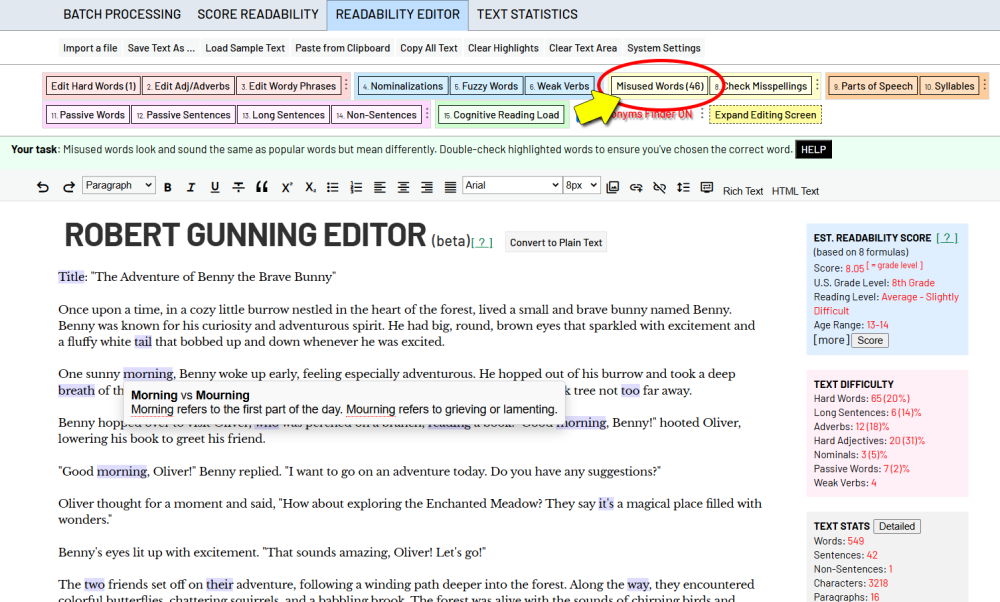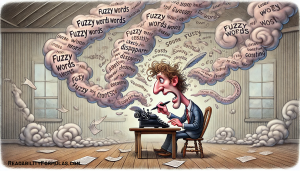Imagine you’re writing a new story. You’re in the zone, typing away. You type your next word—“brake”—and suddenly freeze. Is it brake (as in stopping a vehicle), or break (as in taking a pause)? You stop, re-read the sentence, and feel frustrated. You’re not sure. This confusion is all thanks to homonyms—the tricksters of language. They can be both friend and foe. Used well, they add nuance and depth to your writing. But misuse them, and you risk adding confusion…or unintentional humor. Every writer has had that moment—when a word derails your flow as you figure out which “sound-alike” you need to use.
Homophones: Same Sound, Different Meanings
Homophones sound exactly the same but have different meanings…and sometimes they have different spellings. Here are some common examples:
There, Their, and They’re: The Unholy Trinity
- There is a location. It’s like a GPS for your sentences. “Look over there!” It tells you where something is. Easy enough, right?
- Their is a possessive word. It means something belongs to them: “That’s their pizza.” (But let’s be real—if it’s pizza, it should probably be yours.)
- They’re is short for “they are.” It’s the most complicated of the three, but think of it as two words: “They’re going to the mall.”
One day you might find yourself saying, “They’re going to eat their pizza over there.” It’ll sound right, but writing it will hurt your brain. Just remember: location, possession, and “they are.” Boom—you’re a homophone genius.
To, Two, and Too: The Dynamic Duo… Plus One
Next up, we have to , two , and too . These three words hang out together and cause trouble in your writing. Let’s break them down so they don’t fool you anymore.
- To is like a pointing finger. It shows direction or purpose: “I’m going to the store,” or “I want to eat ice cream.” Basically, it tells you what’s happening or where someone’s going.
- Two is simple—it’s a number! “I have two dogs,” or “Give me two slices of cake.” (Or better yet, give me the whole cake, but that’s beside the point.)
- Too is a little extra. It can mean “also,” like when you want to say, “I want cake too,” or it can mean “too much” of something, like “That’s too much cake” (though let’s be honest, there’s no such thing).
If you ever write,”I’m going to the store to buy two cakes too,” congratulations—you’ve just used all three words in one glorious homophone sentence.
Bare and Bear: To Be Nude or Get Mauled by a Grizzly
Here’s another classic pair: bare and bear. They sound identical, but you definitely don’t want to mix them up in conversation.
- Bare means naked, uncovered, or exposed. If you bare your soul, you’re being vulnerable and honest. If you bare your feet, well, you’re just walking around without shoes.
- Bear is either a large, furry animal (the kind you do not want to meet in the woods) or it can mean to endure something. “I can’t bear this math homework!” means it’s driving you crazy. But if you say, “I saw a bear in the woods,” you’re probably running for your life.
Top 15 Homophones
| Homophone | Meaning | Homophone | Meaning |
|---|---|---|---|
| Flour | Powdered grain used in baking | Flower | The colorful part of a plant |
| Brake | A device for slowing or stopping a vehicle | Break | To separate into pieces or stop working |
| Right | Correct or proper; the opposite of left | Write | To put words on paper |
| Here | In this place | Hear | To perceive sound with your ears |
| Peace | A state of tranquility or calm | Piece | A portion or part of something |
| Bye | A farewell greeting | Buy | To purchase something |
| Weather | The condition of the atmosphere | Whether | Expressing a choice between alternatives |
| Knew | Past tense of know | New | Something recent or never used |
| Steal | To take something without permission | Steel | A strong metal made from iron |
| Sea | A large body of saltwater | See | To perceive with the eyes |
| Weak | Lacking strength | Week | A period of seven days |
| Son | A male child | Sun | The star that the Earth revolves around |
| Letters and packages delivered to homes | Male | A person or animal of the male gender | |
| Board | A flat piece of material for building | Bored | Feeling uninterested |
| Pail | A bucket | Pale | Lacking in color |
Ha-Ha-Ha!
Tweet: In 2013, Paris Hilton tweeted about her work, saying: “Excited to play a big roll in this movie!“
Homophone Confusion: Roll (something that rolls or a piece of bread) vs. Role (a part in a film or play).
What Happened: Paris used roll instead of role , making it sound like she would be playing a large piece of bread or something that physically rolls. The tweet sparked a wave of jokes about her bread acting debut.
Homographs: The Secret Agents of English
While homophones like to play dress-up and confuse you with their identical sounds, homographs are sneakier. These words are spelled the same but have different meanings based on how you use them. These words like living double lives—one minute they’re innocent, and the next, they’re causing chaos.
Wind: A Breeze or Chores?
Take wind , for example. If someone tells you, “I love the wind,” you’ll probably picture a cool breeze blowing through the trees on a sunny day. Sounds peaceful, right?
But then, in the next breath, someone says, “Hey, can you wind up that string?” Now you’re stuck doing chores! How did a relaxing breeze turn into a task? Wind really knows how to switch things up on you.
Tear: Are You Crying, or Ripping Something Apart?
Another tricky homograph is tear . If you’re watching a sad movie, you might shed a tear. But if you’re frustrated with your homework, you might tear it apart. Same spelling, but one is about crying, and the other is about destruction. English is emotional like that.
So, next time you say, “That movie was so sad, it brought a tear to my eye,” just make sure no one thinks you ripped the DVD in half out of frustration.
Bass: Music or Fish?
Let’s talk about bass . If you’re into music, bass is that deep, thumping sound that makes your heart dance. “Feel that bass drop!” you might say at a concert.
But if you’re at a lake, bass isn’t music—it’s a fish. “I caught a huge bass!” Now, unless your fish is dancing, we’re talking about something completely different. But the spelling? Exactly the same.
So whether you’re jamming out to music or trying to catch dinner, just know that bass is living a double life—one in the water and one on your playlist.
Top 15 Homographs
| Homograph | Meaning | Meaning |
|---|---|---|
| Present | A gift (pronounced *prez-uhnt*) | To give or show something (pronounced *pri-zent*) |
| Wound | An injury (pronounced *woond*) | To wind or twist something (pronounced *wound*) |
| Minute | A small unit of time (pronounced *min-it*) | Very small (pronounced *my-noot*) |
| Refuse | Trash or garbage (pronounced *ref-use*) | To decline or reject something (pronounced *ref-yooz*) |
| Excuse | A reason or explanation (pronounced *eks-kyoos*) | To forgive someone (pronounced *eks-kyoos*) |
| Live | To be alive (pronounced *liv*) | Broadcast in real time (pronounced *lahyv*) |
| Contract | A written agreement (pronounced *kon-trakt*) | To shrink or tighten (pronounced *kuhn-trakt*) |
| Desert | A dry, sandy region (pronounced *dez-urt*) | To abandon (pronounced *di-zurt*) |
| Contest | A competition (pronounced *kon-test*) | To challenge or argue (pronounced *kuhn-test*) |
| Subject | A topic of discussion (pronounced *sub-jekt*) | To bring under control (pronounced *sub-jekt*) |
| Digest | A summary of information (pronounced *dai-jest*) | To break down food in the stomach (pronounced *di-jest*) |
| Conduct | Behavior (pronounced *kon-dukt*) | To lead or manage (pronounced *kuhn-dukt*) |
| Permit | An official document allowing something (pronounced *pur-mit*) | To allow or give permission (pronounced *per-mit*) |
| Entrance | A place to enter (pronounced *en-truhns*) | To fill with wonder or delight (pronounced *en-trance*) |
| Polish | A substance used for shining surfaces (pronounced *pol-ish*) | Relating to Poland (pronounced *paw-lish*) |
Ha-Ha-Ha!
Instagram Post: In 2018, Ariana Grande posted a photo with the caption: “I finally feel at piece.“
Homophone Confusion: Piece (a portion of something) vs. Peace (calmness or absence of conflict).
What Happened: Ariana mixed up peace with piece, making it sound like she was literally talking about a piece of something rather than inner calm. The post led to confusion and jokes from fans.
Impact: The post quickly became meme material, with fans joking about Ariana finding her missing piece and speculating what it might be.
Double Trouble: Homophones and Homographs
Now, let’s kick things up a notch. If you thought homophones and homographs were confusing on their own, get ready for words that are both homophones and homographs. These words sound the same, are spelled the same, but—surprise!—they still have completely different meanings depending on how they’re used. It’s like English decided to play a prank on you by creating the ultimate word puzzles.
Let’s break down a few of these double-trouble words so you can feel like a word detective when you come across them.
Row: A Line or an Argument?
Here’s a word you might not use every day, but when you do, it can cause some confusion. Row is a word that likes to change its meaning depending on whether you’re organizing things or, well, fighting.
Row (pronounced roh) is when you line things up in a neat, organized way. “I put all my books in a row on the shelf.” Row (pronounced rau, like cow) means an argument or a loud disagreement. “My brother and I had a row about whose turn it was to play video games.” Yep, that’s the sound of some serious sibling drama.Same spelling, two different pronunciations, and completely different meanings! Are you lining up your books neatly, or are you in a shouting match with your sibling? Only the sentence knows!
Bow: A Knot or a Gesture?
The word bow is another sneaky one. You see it in one sentence, and you might think it’s referring to a cute ribbon tied in your hair, but in another context, it’s a formal gesture or even a weapon!
Bow (pronounced boh) refers to something tied, like a ribbon or shoelace. “I tied a bow on my gift.” Bow (pronounced bau, like cow) is what you do when you perform in front of people, like at a school play: “After the play, I took a bow to the audience.” It’s also a weapon, like a bow and arrow: “Katniss used her bow to save the day in The Hunger Games.”So, which bow are we talking about? Is it a fancy knot, a stage move, or a tool for hunting? Once again, context to the rescue!
Close: Nearby or Shut?
Here’s a word that changes its meaning depending on what action it’s describing. Close can mean something is nearby, or it can mean you’re shutting something up—like a door or your book after a long day of studying.
Close (pronounced klohs) can mean nearby or next to something: “The ice cream shop is close to my house.” That’s always good news, right? Close (pronounced klohs) also means to shut something: “Don’t forget to close the door on your way out!”Same spelling, same pronunciation, but completely different meanings depending on the situation. Are you talking about proximity, or are you shutting something? Just like that, the word goes from describing distance to being a command.
Ha-Ha-Ha!
Tweet: In 2016, Chris Brown tweeted: “Here’s a sneak peak of my new album!“
Homophone Confusion: Peek (a quick look) vs. Peak (the top of a mountain or the highest point).
What Happened: Brown used peak instead of peek, making it sound like his album was reaching a mountain summit rather than offering a quick preview. Fans were quick to point out the mistake and mock the tweet.
Impact: The error led to jokes about Chris Brown’s music climbing to the top of a literal mountain, with fans posting pictures of albums on peaks.
Real-World Homophone Hijinks and Hilarity
Imagine walking into a coffee shop on a Monday morning, desperate for a pick-me-up. You scan the menu and see: “Complimentary coffee with every purchase!” Your caffeine-deprived brain does a happy dance. Free coffee! What a deal! But after ordering, you’re handed the bill and notice—you’ve been charged. Confused, you point to the sign. The barista chuckles, “Oh, that means the coffee complements your purchase—it goes well with it. You still have to pay.” Well, there goes your Monday mood.
It’s easy to see how a single word—or even a misplaced letter—can send us down the wrong path, creating confusion, frustration, or sometimes a good laugh. While the complementary vs. complimentary mix-up may just cost you a cup of coffee, in the world of business, education, and law, these homophone slip-ups can cause much bigger problems. From costly legal delays to students failing exams over a single letter, the consequences of these innocent mistakes are anything but minor.
1.
Legal Industry: “Bearer” vs. “Barer” (Case of the Misinterpreted Will)
Case: In a legal case regarding the inheritance of a large estate, a will read: “The bearer of this will is entitled to all assets.” The lawyer mistakenly typed “barer” instead of “bearer” in the final draft of the will.
Homophones: Bearer (a person carrying something) vs. barer (someone who is exposed or unclothed).
Result: The family contesting the will argued that barer didn’t legally specify who should receive the assets. The mistake led to months of legal delays and confusion as lawyers worked to clarify the will’s intent. The case became a point of humor in legal circles due to the unintended image of an unclothed person inheriting an estate.
Lesson: In legal documents, precision is key. A single letter or a misplaced homophone can change the entire meaning of a contract or will.
2.
Finance Industry: “Principal” vs. “Principle” (Investment Bank Mix-Up)
Case: A major investment firm sent out a client update announcing a new principal investment strategy, but the memo was filled with instances of the word principle instead of principal.
Homophones: Principal (referring to the initial amount of an investment or an important individual) vs. principle (a foundational rule or concept).
Result: Many clients misunderstood the strategy, thinking it was about ethical principles rather than financial principal. Several clients raised concerns about their investments being tied to moral or ethical considerations, when in fact, the firm was introducing a new financial strategy related to their principal amounts. This caused weeks of clarifications and a hit to the firm’s reputation for precision.
Lessons: In the finance industry, the use of precise terms is crucial, especially when it comes to money management. Misuse of homophones in communication can lead to misinterpretation and loss of trust.
3.
Hospitality Industry: “Complimentary” vs. “Complementary” (Hotel Guest Chaos)
Case: A hotel advertised that it was offering complementary breakfast to all guests. The confusion arose because they used complementary (which means something that goes well with something else) instead of complimentary (which means free of charge).
Homophones: Complimentary (free) vs. complementary (something that pairs well with something else).
Result: Guests checked in thinking they would receive free breakfast, but the staff explained that breakfast was only complementary (pairing with the hotel stay) but not free. Many guests were frustrated, leading to complaints and negative reviews. Some guests even left the hotel after learning that they had to pay for breakfast, assuming the word meant free in their booking confirmation emails.
Lessons: The hospitality industry relies on clear communication with customers. A single homophone mix-up can lead to false expectations and damaged customer satisfaction.
4.
Medical Industry: “Ileum” vs. “Ilium” (Anatomical Confusion in Surgery)
Case: In a medical setting, a surgeon mistakenly referred to the ileum (the final section of the small intestine) as the ilium (a part of the hip bone) during a surgical team briefing.
Homophones: Ileum (part of the small intestine) vs. ilium (part of the pelvis).
Result: The mix-up led to confusion among the surgical staff, with team members initially preparing for surgery on the patient’s hip area instead of focusing on the intestines. While the error was caught early, it delayed the procedure and led to frustration. The mistake became a source of embarrassment and was used as a learning point for the team during debriefing.
Lessons: In the medical industry, the difference between life-saving and dangerous errors often hinges on precise terminology. Using the wrong homonym can cause confusion and unnecessary risk for patients.
5.
Retail Industry: “Sale” vs. “Sail” (Promotional Disaster in a Clothing Store)
Case: A national retail chain sent out a promotional email stating: “Get ready for our huge Sail!” instead of “Sale!” during a clearance event.
Homophones: Sale (a discount event) vs. sail (a piece of fabric used on a boat).
Result: Customers were baffled by the message and mocked the company on social media, wondering if the store had shifted to selling boating supplies. Some customers even called the store to inquire if there were discounts on nautical products. The error went viral on social media, leading to humorous memes and embarrassing press for the store.
Lessons: In the retail industry, miscommunication in promotions can go viral quickly and affect brand image. A single typo in marketing materials can cause widespread confusion and unintended humor.
6.
Technology Industry: “Cache” vs. “Cash” (Tech Support Fiasco)
Case: A tech support specialist advised a customer to clear their cache (temporary stored data on their browser), but the customer misheard it as clear their cash (money).
Homophones: Cache (temporary storage) vs. cash (money).
Result: The customer misunderstood the instruction and panicked, thinking they had to wipe out their savings or money-related data. The miscommunication led to multiple calls to customer service and a follow-up from management to reassure the customer that no financial loss was involved. The error became a running joke within the tech support team.
Lessons: In technology, where customers may not always be familiar with technical jargon, it’s important to ensure homophones are clearly explained to avoid panic and confusion.
7.
Entertainment Industry: “Role” vs. “Roll” (Casting Call Confusion)
Case: A casting call for a major movie was sent out, stating they were looking for someone to fill the lead roll. This led to confusion in the industry.
Homophones: Role (a character in a play or movie) vs. roll (something that moves or is round, like a bread roll).
Result: The miscommunication caused some actors to joke about auditioning for a lead bread roll or for roles that required rolling, creating a humorous scenario on social media and in industry circles. Although it was a harmless mistake, it caused embarrassment for the production company.
Lessons: In entertainment, details matter. Using the wrong homophone in casting announcements can lead to misunderstandings, humor, and damage to professionalism.
8.
Education Industry: “Principal” vs. “Principle” (School Policy Mix-Up)
Case: A school administrator sent a memo to all staff and parents about new school principles (referring to policies) but mistakenly wrote principal throughout the document.
Homophones: Principal (head of a school) vs. principle (a fundamental belief or rule).
Result: Parents and staff were confused, thinking the memo was about the principal of the school (the person in charge) rather than new principles (guiding policies). This caused a series of follow-up emails and clarification meetings, leading to unnecessary chaos and concern among the school community.
Lessons: In education, where communication with parents and staff is crucial, misusing homophones can create significant confusion about roles and responsibilities.
Ha-Ha-Ha!
Tweet: After a weekend of protests and violence in Charlottesville in 2017, Donald Trump tweeted: “Our great country has been divided for decades. Sometimes you need protest in order to heel, & we will heel, & be stronger than ever before!“
Homophone Confusion: Heel (the back of a foot or to follow closely) vs. Heal (to recover or restore health).
What Happened: Trump mistakenly used heel instead of heal, making it sound like the country needed to follow obediently like a dog rather than recover. This sparked confusion and mockery on social media.
Impact: The tweet went viral, with social media users poking fun at the mix-up, even creating memes about America needing to “heel” like a trained dog.
Context is Your Best Friend
Using homophones and homonyms without enough context is like handing your readers a pair of clown shoes—things are bound to get awkward and confusing. Without proper clues, your audience might trip over your words, giggling (or grimacing) as they try to figure out what you really meant.
Example 1: The Farmer and the Bank
Imagine you stumble upon this masterpiece of a sentence: “The farmer went to the bank.”
Wait, what? Is the farmer withdrawing money, or did they just take a scenic walk along a river? The suspense is unbearable!
But add just a few little clues, and suddenly it all makes sense: “After a long day of work, the farmer went to the bank to deposit his earnings.”
Aha! So it’s not a riverside stroll, it’s a money move. Now we know the farmer isn’t fishing for compliments but cashing in!
Example 2: The Desert(ed) Dessert Dilemma
Now brace yourself for this tongue-twister: “She didn’t want to desert her dessert.”
I mean, who would want to desert their dessert? Cake is sacred! But wait, are we talking about abandoning a dessert, or does this person want to take their cake to the middle of the Sahara?
Context saves the day again: “Even though the party was over, she didn’t want to desert her dessert, especially with that delicious slice of cake in front of her.”
Phew! Crisis averted. The cake remains unharmed, safely in the presence of its dedicated admirer. The difference between dessert and desert becomes as clear as the frosting on that slice of cake.
The Dangers of Going Context-Free
What happens when you let your homophones and homonyms run wild without supervision? Chaos, dear writer, chaos. Let’s explore the madness that ensues.
Readers Get Stuck: If your meaning isn’t obvious, readers will hit the brakes faster than someone seeing a “Closed for Cake Day” sign. They’ll have to pause, re-read, and wonder if you’re writing about flying bats or wooden sluggers.
Mental Gymnastics: Without enough clues, your readers are forced to perform mental acrobatics just to keep up. If you think parkour is tricky, try understanding a sentence with no clear direction!
Mass Confusion: You might write, “The bat flew across the room.” And now your poor reader is torn—did a bat swoop down from the rafters, or did someone’s baseball bat take flight? This is not the mystery novel they signed up for.
Thankfully, it’s easy to clear things up: “A bat flew across the room, startling everyone as it swooped over their heads.” Now we know for sure we’re dealing with a flying creature and not a possessed piece of sports equipment.
How to Avoid a Context Catastrophe
Don’t worry—helping your readers avoid confusion is easier than you think. Here are a few tips:
Add Extra Details: Instead of “She went to the bank,” try “She went to the bank to cash her check,” so there’s no mistaking the destination for a riverside picnic.
Describe Like a Pro: Throw in some adjectives to do the heavy lifting. Instead of saying “the bat,” you can say “the baseball bat” or “the winged bat.” Trust me, your readers will thank you for the clarification—and maybe their nightmares will, too.
Rephrase If It’s a Head-Scratcher: If your sentence still seems murky, give it a makeover. Swap out “The lead was heavy” with “The lead pipe was heavy” or “The team leader felt the weight of responsibility.” No one likes a vague sentence, and your readers will appreciate not having to guess what’s going on.
Use our free Robert Gunning Editor to highlight homophones and homonyms in your text. The editor checks for more than 400 common misused English words. Simply import or paste your text into the editor, and click the MISUSED WORDS button.
Scott, Brian. “Homonyms: The Word Twins That Love to Confuse!.” ReadabilityFormulas.com, 8 Apr. 2025, https://readabilityformulas.com/homonyms-the-word-twins-that-love-to-confuse/.












